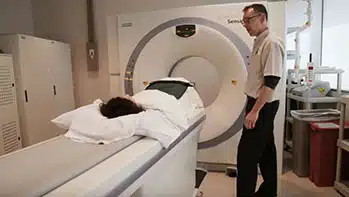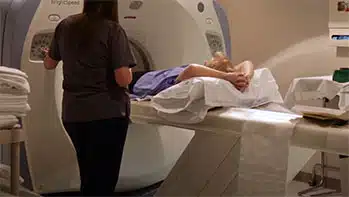Cardiac Calcium Scoring
A heart CT, also called Coronary Artery Calcium Scoring, is a simple, non-invasive CT exam that evaluates the extent of calcified plaque buildup in the arteries of the heart—a possible indicator of heart disease.
Early detection can help reduce your chances of having a heart attack by encouraging lifestyle changes or planning treatment options with your doctor.
This exam may not be covered by insurance. Call your local center for cost information.
What You Need To Know
This exam is recommended for men (age 35-70) and women (age 40-70) who have any of the following risk factors:
- Family history of heart disease
- Smoking
- Diabetes
- High cholesterol
- High blood pressure
- Overweight
Cardiac calcium scoring is not for everyone. If you have any of the following, the exam is not recommended:
- Prior heart attack, angioplasty/stent or bypass surgery
- Resting heart rate above 90-95 beats per minute
- Cardiac implants including mechanical heart valves, pacemaker wires or stents
- Pregnancy
- Our clinical teams are committed to capturing high-quality diagnostic images using the appropriate amount of radiation for you. While you are exposed to radiation during a CT exam, the benefits typically outweigh the long-term risks.
- Be sure to tell us if you are pregnant, nursing, or if there is a chance you may be pregnant.
What To Expect
- We’ll give you a call before your appointment to talk through preparation instructions and your past imaging exams.
- No smoking 24 hours prior to scan.
- No caffeine, chocolate or decaf coffee 24 hours prior to your exam. If the patient has had caffeine or other stimulants, they cannot do the exam.
- Be sure to tell us if you are pregnant, nursing, or if there is a chance you may be pregnant.
- On the day of your exam, please arrive 15 minutes early for check-in. If instructed to do so, please bring prior imaging results with you.
- When you arrive, you will be led to a changing room and given a pair of scrubs to wear for your exam. You will be given a locker to store your clothes, and anything else you may have with you during your exam.
- The technologist will help position you onto the scanner table. You may have electrodes attached to your chest to monitor your heart rhythm.
- Once you are comfortably positioned, the technologist will go out of the room to run the scanner from a computer located directly next to the scanner suite, visible through the viewing window. The technologist will communicate with you throughout the exam and check to see how you are doing.
- You will be asked to hold your breath for several seconds as pictures are taken of your heart. You’ll be holding your breath two or three times— with plenty of time to breathe in between.
- When your scan is complete, you’ll be escorted back to the changing room so you can change out of the scrubs and back into your clothing.
- Once you have changed, your appointment is complete. You do not need to check out with the front desk when you leave.
- After the exam, your images will be sent electronically to a radiologist who will review the information and send a report to your referring provider, typically within one to two business days.
- You will receive your report in the mail, which will outline how you compare to other individuals of your age and gender, and whether you have any likelihood of obstructive coronary artery disease.
The results of the exam will be shared with you and your doctor. Talk with your doctor about the results and how to best plan for next steps.
What does the heart score mean?
0: No Identifiable Calcification
1-10: Minimal Calcifications
11-100: Mild Calcifications
101-400: Moderate Calcifications
401 and above: Significant Calcifications.

 Coronary Artery Calcium Scoring (CACS) warns of heart disease risk
Coronary Artery Calcium Scoring (CACS) warns of heart disease risk